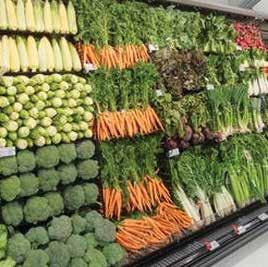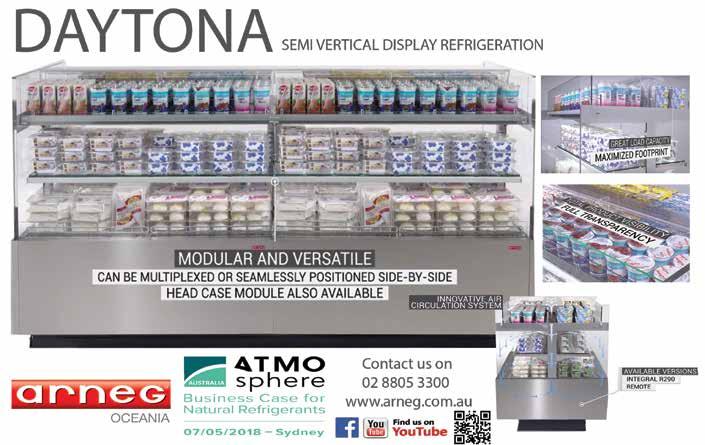
4 minute read
Food in the nude
NATIONAL
New Zealand is ditching the plastic packaging from fruit and vegetables in supermarkets.
In a recent MGAQ Committee meeting discussion concerning the independent supermarket sector leading industry best practice in terms of reducing waste, prominent Queensland Sunshine Coast retailer Roz White raised the concept of “food in the nude”. Roz felt our industry sector could take the lead on this allimportant initiative which could not only help to reduce waste but significantly increase sales of fresh produce.
Below is an extract of an article sourced from a New Zealand industry publication which shares rich insights into the “food in the nude” concept that has delighted NZ customers.
“Food in the nude” is a New Zealand campaign to end plastic packaging for fresh produce in supermarkets. Foodstuffs have signed the NZ Plastic Packaging Declaration which is committed to making all store and private label packaging 100 percent reusable, recyclable or compostable by 2025.
The NZ Herald reports that sales of some vegetables have soared by up to 300 percent after a number of New Zealand supermarkets ditched plastic packaging.
A group of supermarkets have abandoned the use of plastic wrapping for virtually all of their fruit and vegetables in a project labelled ‘food in the nude’.
Nigel Bond, owner of one of the stores, says their new shelving system reminded him of when he was a kid going to the fruiterer with his Dad and one could smell the fresh citrus and spring onions. He says by wrapping products in plastic we sanitise them and deprive people of this experience.
“When you take on these projects, they can be a disaster and lead to customer pushback but in my 30 years in the supermarket industry this simple change has resulted in the most positive feedback from customers I have ever received.”
The initiative is part of the war against plastic. In New Zealand the days of singleuse plastic shopping bags are numbered – most supermarkets are no longer providing them at the check-out – while the government late last year agreed to regulations for a mandatory phase-out across all retailers from July 1.
Bond says he and store manager Gary May first came up with the idea over two years ago: “At the time we noticed an increasing amount of fresh produce was being supplied in plastic wrapping. We thought this was crazy and vowed and declared to do something about it.
“I went on a study tour to the United States and saw what the Whole Foods supermarket chain is doing over there,” he says. “They have a massive range of fresh food and their merchandising is almost an art form.”
Bond began discussions with growers and suppliers, most of whom he says were happy to look at ways of providing produce free of plastic packaging.
A new refrigeration shelving system for displaying fresh fruit and vegetables was installed along with a process known as ‘misting’ to help keep items fresh.
“Vegetables are 90 per cent water and studies have shown that misted produce not only looks better, retains its colour and texture, but also has higher vitamin content,” Bond says. “We’ve also installed a reverse osmosis system that treats the water by removing 99 per cent of all bacteria and chlorine, so we are confident the water we’re misting with remains pure.”
Bond says some produce – including berries, grapes and some tomatoes – still come in plastic containers while mushrooms are packaged in cardboard trays. Most of this packaging is, however, recyclable.
He says Foodstuffs is also trialing paper alternatives to foil seafood bags and fibre-based deli trays.
Foodstuffs have signed the NZ Plastic Packaging Declaration which is committed to making all store and private label packaging 100 per cent reusable, recyclable or compostable by 2025. It has also introduced recyclable food trays – a measure that gives customers the opportunity to divert more than 80 million trays from landfill every year.
MGA members are encouraged to look at all forms of entrepreneurship and innovation in their stores to seek a point of difference and to vigorously compete against the 2 giants and the overseas discounter.
Photo – courtesy nzherald.com.nz
NATIONAL
How Private Company Tax changes will affect your cashflow
The government is proposing a number of changes to the treatment of private company loans (‘Div. 7A’ loans). The major proposed changes, most of which are to apply from 1 July 2019 include: • Increased interest rate – anticipated to be more than 3% higher • 10 year complying loan term replacing both 7 and 25-year loan terms • Previously quarantined loans having to be repaid over 10 years – with interest • Trust distributions (UPE) to private companies to be deemed loans – repayable with interest • Extension of review period for Division 7A amendments increased to 14 years
The changes will have significant cashflow impacts for many businesses.
Making FBT easy
The 2019 FBT lodgment season is upon us and the ATO have certain target areas: • Car parking benefits • Salary packaged meal entertainment • Motor vehicle exclusions • Gift and restaurant vouchers • Uber and taxi travel • Failure to identify benefits and lodge a return
Call Phil Ibbotson or Rami Kulafi to discuss this or any other business matters you may have.
(03) 9824 5533 or www.imaccountants.com.au











